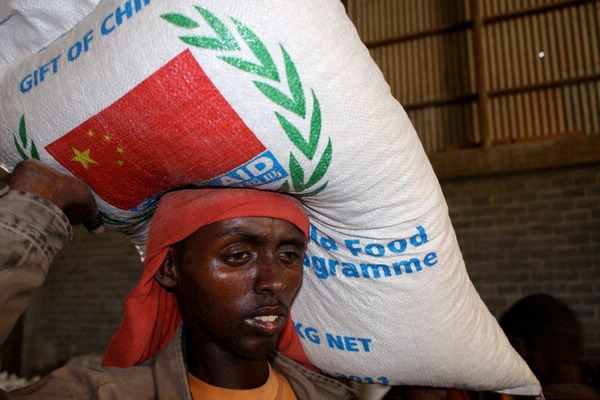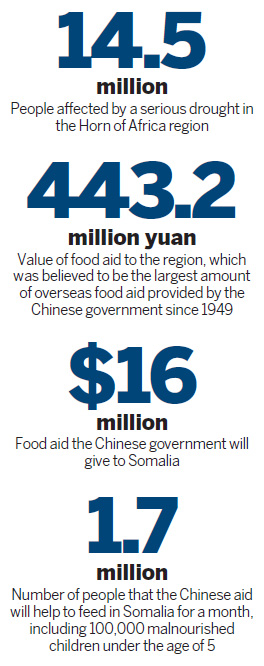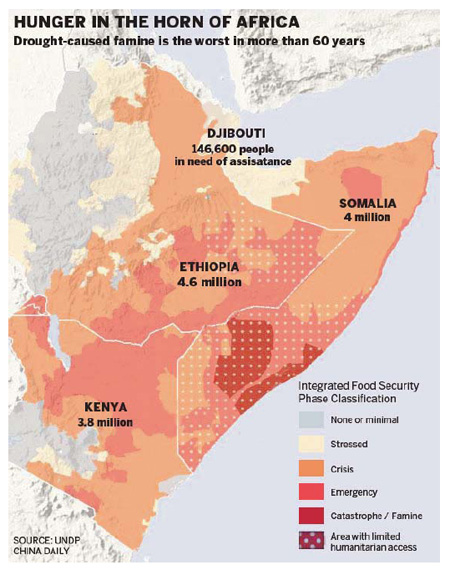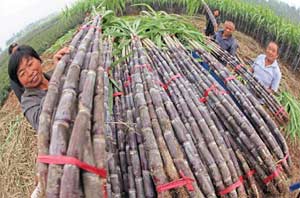A time for giving as hunger stalks a distant land
Updated: 2011-10-14 07:56
By Li Lianxing (China Daily)
|
|||||||||
|
 |
|
Emergency food supplies from China are delivered in Mogadishu, Somalia, on Wednesday. [Provided to China Daily] |
Eipa Eloto can't remember the last time it rained in the village of Lorenge Lup in the Turkana desert of northern Kenya, more than 700 kilometers from the capital, Nairobi. Harvests have become a thing of the past for Eloto, 32, and his family, who now survive on one meal a day.
The Turkana desert, an area covering nearly 70,000 square kilometers of the East African country, has few roads and little emergency food aid gets through.
The drought hitting northern Kenya, Ethiopia, Djibouti and most of central and southern Somalia, has resulted in the worst famine in 60 years, according to the United Nations. More than 14.5 million people are under threat in the parched Horn of Africa.
|
 |
The Chinese government announced that it would provide food aid worth 443.2 million yuan ($68.65 million) as soon as famine and drought became apparent last summer.
This was the largest amount of overseas food aid provided by the government since the founding of New China in 1949.
Before government aid arrived, the Kenya-China Trade and Economic Association and other Chinese organizations in Kenya sent a relief convoy on Sept 22 consisting of 60 tons of maize and 5 tons of beans to help feed more than 9,000 people in Lorenge Lup.
The day this much-needed lifeline arrived, Eloto said, he and his family of 11 left home in the very early morning. They walked for more than three hours to get their share of the food aid.
"We'd never expected one day some Chinese would give us food until we really saw it," Eloto said, this family received 110 kilograms of food that would feed them for more than two months.
About 80 km from where Eloto and his family live, two rivers - the Kerio and the Turkwel - could provide them better farming and living conditions. The local government is trying to persuade local people to move there.
Eloto's sister died last year due to hunger but he said his family "would never leave this land". His family has been there for many generations.
For Margret Adonga Nabenyo, a 41-year-old woman living in Lorenge Lup village, a sentimental attachment to the area is only one of her reasons for not moving.
"It is too difficult for us to adapt to another kind of life, and where else we can go? Drought is everywhere," said Nabenyo.
The local government of Lodwar is running a monthly food distribution program for remote villages such as Lorenge Lup, according to District Commissioner Nakitare Humphrey.
"We are in partnership with some international organizations like the United Nations World Food Program (WFP) to distribute food that can sustain their life for a month," he said. "It normally takes us three weeks to walk around this region. After one week's rest, we will start the distribution cycle again."
However, Nabenyo, a mother of 10, said that at best the government officials appeared every two months.
"The longest time we waited was four months, during which all we could do was go to the forest to find some fruit."
For this mother, food distribution is not the most vital thing in her life, but her children's education. She said a better education for her children would bring her and her family more than food in the future.
Eloto said if there were a permanent home and farm for his family in another place, then they would be willing to migrate.
When asked what would happen if the government stopped running the food distribution program, Eloto and Nabenyo both said the only choice for them was to die.
|
 |









